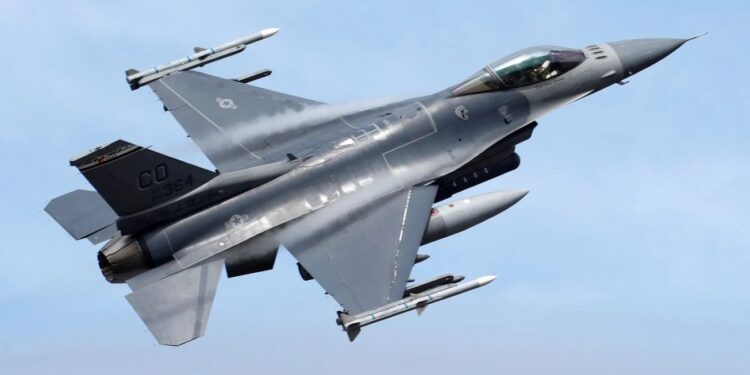- Denmark and the Netherlands are sending F-16 fighter jets to Ukraine, with US approval.
- The jets aren’t likely to arrive until next year as Ukrainian pilots need to be trained first.
- A military expert warned that there could be issues with maintaining the aircraft.
The US last week gave its blessing for F-16 fighter jets to be transferred from Denmark and the Netherlands to Ukraine once pilots have been trained to fly them.
Ukraine has long coveted the US-made jet as it seeks to bolster its air capabilities in its war with Russia, which has a more advanced air force.
President Joe Biden had resisted providing F-16s or training, but the White House’s 180 means F-16s could be available to Ukrainian forces by early next year.
Specifications
The F-16 is a multi-role fighter built by Lockheed Martin for the US Air Force.
It was conceived in the early 1970s as an alternative to fighter jets that had grown increasingly heavy and less nimble, and more than 4,500 aircraft have been produced for 26 nations, per Lockheed Martin.
“Its smooth blended-wing body provided extra lift and control; its critical fly-by-wire system kept the design stable and increased its agility; and its slightly tilted back ejection seat, side-mounted control stick, head-up display and bubble canopy improved pilot survivability as well as visibility and control,” the company says on its website.
The jet, which costs about $63 million, can hit speeds of up to 1,500 mph.
Its payload usually consists of two 2,000-pound bombs, two AIM-9 sidewinder missiles, two AIM-120 medium-range air-to-air missiles, and two 2,400-pound external fuel tanks.
It’s also armed with one M-61A1 20mm multibarrel cannon, which holds 500 rounds.
But while the F-16 will boost Ukraine’s air force, many issues remain, said Justin Bronk, a senior research fellow at the Royal United Services Institute, in a thread on X.
He said the F-16 was “a complex aircraft” and that it would “take years to train journeyman or master-level maintainers” to service the jets.
This meant Ukraine would have to rely heavily “on civilian contractors to supervise and provide on-the-job training to Ukrainian maintainers in-country, even after months of initial training.”
“This is an issue because any F-16 bases set up inside Ukraine will be priority targets for Russian cruise and ballistic missile strikes. Therefore, more ground support equipment and contractors are needed to enable dispersed basing, and they’ll still be actively targeted,” he added.
Training
Another issue is the time needed to train Ukrainian pilots to fly the F-16.
Gen. James Hecker, commander of US Air Forces in Europe, said last week that training had begun with “young pilots that barely have any hours at all” who were receiving English language tuition in the UK.
“That all is going to take time … so that’s why it’s going to be at least until next year until you see F-16s in Ukraine. It’s not going to be the silver bullet.”
In late July, US National Security Council spokesman John Kirby said in a briefing that Ukrainian F-16 pilots would be trained in Denmark and Romania, and possibly other countries too.
The Greek air force will take part in training Ukrainian pilots, Volodymyr Zelenskyy said in Athens Monday during a press briefing with his Greek counterpart, Kyriakos Mitsotakis, Al Jazeera reported.
Greece’s air force is largely comprised of F-16s and it is regarded as an experienced and capable user of the jets.
Meanwhile, the Dutch defence minister Kajsa Ollongren met with her Ukrainian counterpart, Oleksii Reznikov, in Kyiv Tuesday and presented him with a model F-16.
The US will also begin training Ukrainian pilots to fly and maintain F-16s in Arizona in October, the Pentagon said Thursday.
The training is “in support of the international effort to develop and strengthen Ukraine’s long-term defenses,” Pentagon Press Secretary Air Force Brig. Gen. Pat Ryder said.
Source: I N S I D E R



Recent Comments